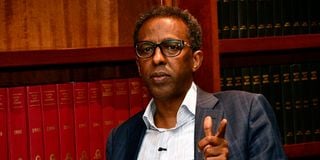Ahmednasir Abdullahi: Let's clean up rot in the Judiciary, but Ruto must obey court decisions

Senior Counsel Ahmednasir Abdullahi.
Senior Counsel Ahmednasir Abdullahi is taking no prisoners in the corruption in judiciary debate, warning that some judges must be sent home to make the country’s corridors of justice clean.
Joining President William Ruto’s calls for a big broom to sweep the rot in the corridors of justice, Mr Abdullahi says corruption has hit unprecedented levels in the country’s history.
“One of the things I advised the President before he came to power was the rot at the judiciary because the status quo of the judiciary as of 2022 was not tenable going forward. I told him how endemic corruption is,” Mr Abdullahi said in an interview with Nation.Africa.
While he differed with President Ruto’s resolve to disobey court decisions, in the same breath, the Senior Counsel says another radical surgery is necessary to restore confidence in the judiciary.
“There is an obligation on the president to obey court orders but we cannot have a judiciary that is controlled by third parties to sabotage the government, this makes it a rogue institution. I do not think it is an option for him to disobey court orders. His only option is to ensure that the corruption that has permeated the judiciary is addressed,” he said.
Radical surgery
The radical surgery, he says, should take a bipartisan approach to involve all stakeholders, among them opposition to set up disciplinary systems to check excesses of some judges, and send home corrupt ones.
“There is a complete breakdown and anarchy in the judiciary. In my view, this cannot continue anymore. I have been talking about this corruption for a long time,” he said.
Some judges, Mr Adullahi noted, operate with impunity, accusing the Judicial Service Commission (JSC) of protecting corrupt judges.
“I have never seen the level of corruption in the judiciary as it is now. Even during Moi’s time, it was not at this level,” he claimed.
With a strong and efficient judiciary, the Senior Counsel said people will no longer lose properties on the basis of obtained through corruption.
Integrity
However, Mr Abdullahi explained that his criticism of JSC under the leadership of Chief Justice Martha Koome was not personal, but was aimed at protecting the integrity of the judiciary to ensure justice is delivered to all Kenyans fairly and transparently.
Last month, High Court Judge Said Juma Chitembwe was sacked from the Judiciary for taking bribes from former Nairobi Governor Mike Sonko to tilt a land fraud case in his favour.
Mr Sonko provided video evidence before the JSC which was relied upon by a tribunal appointed by retired President Uhuru Kenyatta to investigate the allegations.
Interestingly, Mr Abdullahi said the grounds that were used to remove Mr Chitembwe from office are not as strong as some allegations that have been presented to JSC over some judges.
He claimed that the recruitment of staff at the judiciary is marred with nepotism and corruption instead of merit and integrity.
“I have seen people who were in school together, practised together helping each other get jobs. When we give such a person the job, he becomes the most corrupt,” he said.
“Currently, you see a very young lawyer, with one year of practice, is pushing the biggest cases in town because clients do not need a good lawyer, they understand that the judge is above the law. Nobody values the experience or competence of a lawyer, you get a young lawyer who is not known, and you talk to the judge and get what you want,
“In fact, famous lawyers attract attention when they argue a case, so the client may prefer to do the talking,” he concluded.





